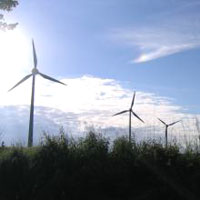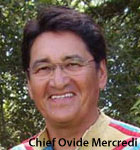
News |
- B.C. First Nations Oppose Pipeline
- 110 Nations Back Copenhagen Accord
- Earthscan Independent Publisher of the Year
- Warming World Work Research Receives Funding
- St. Joseph Wind Project Receives New Backing
- Earth Hour a Signal to G8 Leaders
- Tolko Attempts to Have Elders Jailed
- Alberta Grizzly Bear Hunt On Hold
- New York City to Recycle all E Waste
- Scientists Warn EPA About Ethanol GHGs
- Robin Hood Tax to Help Fight Climate Change
- Manitoba First Nations Seek Hydro Information
| B.C. First Nations Oppose Pipeline | 31 March 10 |
 Twenty-one years after the Exxon Valdez oil spill, British Columbia First Nations says such a disaster can never be allowed to happen again. They declared it will do whatever it takes to stop a proposed Enbridge Gateway pipeline from the Alberta tar sands to the B.C. coast. Twenty-one years after the Exxon Valdez oil spill, British Columbia First Nations says such a disaster can never be allowed to happen again. They declared it will do whatever it takes to stop a proposed Enbridge Gateway pipeline from the Alberta tar sands to the B.C. coast.More than 150 First Nations, businesses, environmental organizations and prominent Canadians have signed on to the campaign to stop the pipeline. "We all believe the Enbridge Gateway pipeline project is a threat to the very existence of our culture and our way of life," Art Sterritt, executive director of the Coastal First Nations told reporters. With the proposed pipeline, crude oil would cross more than 1,000 streams and rivers, mountain ranges, avalanche-prone terrain and rainforest ecosystems before being loaded onto at least 150 tankers annually. "It would be both unwise and irresponsible for Enbridge to ignore us or our constitutionally protected rights and title in British Columbia," states Sterritt. The Coastal First Nations heading the campaign is an alliance of 28 communities on B.C.'s coast. Also the Union of B.C. Indian Chiefs, some aboriginal groups from Alberta, David Suzuki Foundation, the Sierra Club and the Pembina Institute signed on to the campaign. Sign the PetitionView Coastal First Nations website View March 23, 2010 Winnipeg Free Press article View March 25, 2010 Sierra Club press release View March 23, 2010 Globe and Mail article View March 25, 2010 Planet Ark article View Nature Canada March 2010 Enewsletter View March 31, 2010 ForestEthics video Source: Winnipeg Free Press |
|
 Print version Print version |
Top |
| 110 Nations Back Copenhagen Accord | 31 March 10 |
 The number of nations signing onto the non-binding Copenhagen Accord for fighting global warming has risen to about 110 and includes all major greenhouse gas emitters, according to Reuters. The number of nations signing onto the non-binding Copenhagen Accord for fighting global warming has risen to about 110 and includes all major greenhouse gas emitters, according to Reuters.The accord, reached at the December 2009 summit, sets a goal of limiting a rise in temperature to less than 2 degrees Celsius (3.6° F), but does not say how to achieve the goal. Rich nations also aim to give $100 billion a year in climate aid from 2020. Major emitters -- led by China, the United States, the European Union, Russia and India -- all back the deal. Russia has given verbal support even though a U.N. website has not registered a formal letter of backing. More than 60 countries have also submitted domestic goals for reining in climate change by 2020 under the Copenhagen Accord. A U.N. analysis indicates these pledges will only be sufficient to limit global warming to 3 degrees Celsius (5.4° F). Requirements for emissions reduction continue through 2012 under the Kyoto Protocol. View March 19, 2010 Reuters articleView United Nations Framework Convention on Climate Change website View List of Parties Signed onto Copenhagen Accord View March 29, 2010 Center for American Progress Source: Reuters |
|
 Print version Print version |
Top |
| Earthscan Independent Publisher of the Year | 31 March 10 |
 Earthscan has won 'Independent Publisher of the Year' at the 2010 Independent Publishing Awards. Earthscan also won the Lightning Source Academic & Professional Publisher of the Year and the International Achievement of the Year awards, and was shortlisted for digital and innovation awards. Earthscan has won 'Independent Publisher of the Year' at the 2010 Independent Publishing Awards. Earthscan also won the Lightning Source Academic & Professional Publisher of the Year and the International Achievement of the Year awards, and was shortlisted for digital and innovation awards.Earthscan is the leading publisher on climate change, sustainable development and environmental technology for academic, professional and general readers. The organization publishes original, reliable and significant work which helps to foster the conditions for genuine sustainability. Earthscan reduces the environmental impact of their activities, and offset in full the carbon emissions resulting from the production of publications, publication distribution and office/travel impacts. View Earthscan WebsiteView March 22, 2010 Earthscan press release (PDF) View Independent Published Guild website Source: Earthscan |
|
 Print version Print version |
Top |
| Warming World Work Research Receives Funding | 31 March 10 |
 Carla Lipsig-Mummé, professor of Work and Labor Studies at the University of York, has received $1 million for six years of climate labour research from the Social Sciences and Humanities Research Council of Canada. The money will fund an international project studying the challenge climate change presents to Canadian employment and workplaces. Carla Lipsig-Mummé, professor of Work and Labor Studies at the University of York, has received $1 million for six years of climate labour research from the Social Sciences and Humanities Research Council of Canada. The money will fund an international project studying the challenge climate change presents to Canadian employment and workplaces.Lipsig-Mummé and her research team will be examining 7 employment sectors looking at policy, training and employment, and workplace solutions to help businesses in a low emission economy. She will be identifying how institutions and busineses can adapt and contribute to the efforts to contain global warming, and how these institutions will be required to change because of climate change. "We need to know more about the chain of processes that comprise work, employment and training in key Canadian industries and professions and how their decision-makers understand and respond to the challenge that global warming poses to these processes," said Lipsig-Mummé. York University's Institute for Research and Innovation in Sustainability will lead the study that involves 23 researchers, 20 partners and 10 universities from 3 different countries. View February 5, 2010 York University press releaseView February 1, 2010 The Star press release Sources: The Star.com, National Union of Public and General Employee's |
|
 Print version Print version |
Top |
| St. Joseph Wind Project Receives New Backing | 29 March 10 |
 Premier Greg Selinger announced in March 2010 the St. Joseph's wind project in southern Manitoba, west of highway 75, and just north of the US Canada border, will go ahead. The 138-megawatt wind project got the go ahead with a 27- year power purchase deal between Manitoba Hydro and Pattern Energy Group. Premier Greg Selinger announced in March 2010 the St. Joseph's wind project in southern Manitoba, west of highway 75, and just north of the US Canada border, will go ahead. The 138-megawatt wind project got the go ahead with a 27- year power purchase deal between Manitoba Hydro and Pattern Energy Group.St. Joseph's wind project have been in the works since 2008 but were on hold due to parent financing company Babcock and Brown financial difficulties. Pattern Energy of San Francisco bought Babcock and Browns projects including the St. Josephs project. The project had been downscaled from its original 300 megawatts to 138 mw, including a change in type of wind turbine. Pattern Energy will invest $95 million and Manitoba Hydro will loan 260 million to the company. Construction is to be finished by spring 2011 with 60 turbines up and running. The Manitoba government announcement coincided with the 2010 Budget Address in the Manitoba Legislature. View Public Registry for St. Joseph Wind Energy ProjectView March 4, 2010 Red River Valley Echo news article View March 21, 2010 CBC News article View March 22, 2010 Manitoba Government press release View March 24, 2010 Project Finance article Sources: CBC News, Manitoba Government |
|
 Print version Print version |
Top |
| Earth Hour a Signal to G8 Leaders | 29 March 10 |
 Earth hour, March 27, 2010, showed participation by 3400 cities and municipalities in 125 countries including 290 cities in Canada. It is estimated that 10 million Canadians and 1 billion people around the globe turned off their lights for one hour in a symbolic show of support for action on climate change. Organizers want G8 Finance Ministers meeting in Quebec for the June 2010 G8 summit, to take notice recognize people around the world expect climate action. Earth hour, March 27, 2010, showed participation by 3400 cities and municipalities in 125 countries including 290 cities in Canada. It is estimated that 10 million Canadians and 1 billion people around the globe turned off their lights for one hour in a symbolic show of support for action on climate change. Organizers want G8 Finance Ministers meeting in Quebec for the June 2010 G8 summit, to take notice recognize people around the world expect climate action.According to a poll done for WWF in advance of Earth Hour, 88% of Canadians believe it is "important" to "critically important" for Canada to play a strong leadership role in action on climate change. Also 85% of Canadians believe Canada can make a difference in helping to find global solutions to climate change. Canada is hosting and co-chairing the G8 and G20 summits in June, 2010 and has indicated that climate change will be on the agenda. However, Canada has yet to announce its contribution to the $30 billion in funding needed as part of the Copenhagen Accord. Both the government of Manitoba and the City of Winnipeg participated in actions for Earth Hour. View March 26, 2010 WWF-Canada press releaseView March 27, 2010 CBC News article View March 27, 2010 CBC News article View March 28, 2010 PR Newswire article View WWF Earth Hour Fact Sheet (PDF) View Canada G8 Website View Reuters Video View Earth Hour Website Sources: WWF-Canada |
|
 Print version Print version |
Top |
| Tolko Attempts to Have Elders Jailed | 24 March 10 |
 Tolko Industries and the Okanogan Indian Band/Okanogan Nation Alliance (ONA) continue an ongoing struggle over Browns Creek Watershed on the west side of Okanogan Lake. Tolko's recent step has been to appeal to courts to have elders, band members and other supporters removed from road blockades. Tolko Industries and the Okanogan Indian Band/Okanogan Nation Alliance (ONA) continue an ongoing struggle over Browns Creek Watershed on the west side of Okanogan Lake. Tolko's recent step has been to appeal to courts to have elders, band members and other supporters removed from road blockades.Brown Creek watershed contains traditional lands of the Okanogan Indian Bands with valuable archaeological sites and water source for seven first nations that comprise the ONA. In February 2010, British Columbia's supreme court ordered Tolko to restrict its logging practices to 8 cutblocks and that Tolko must conduct archaeological studies on the land before it is logged. However, the court also ruled the ONA can not interfere in Tolko's timber harvesting operations. ONA members had established check points along with their 5 month road blockade, to stop Tolko employees and logging crews from passing into Browns Creek Watershed. First Nations are declaring their lands will not be clear cut. Currently Tolko is standing down due to weather conditions and claiming loss of the winter logging season in the area. ONA Chief Phillip Steward says the logging suspension offers a perfect opportunity for provincial and federal crowns to step in and negotiate a settlement that includes protection of Brown Creek Watershed, and compensation to Tolko Industries for their losses. View March 11, 2010 Kelowna.com articleView March 7, 2010 The Tyee article View February 24, 2010 Manitoba Wildlands news item View February 25, 2010 Union Of BC Chiefs press release View January 11, 2010 BC Supreme Court Ruling Sources: Union of BC Chiefs, Kelowna.com |
|
 Print version Print version |
Top |
| Alberta Grizzly Bear Hunt On Hold | 24 March 10 |
 February 2010, Alberta's government released, Grizzly Bear Status Report, Update 2010. The report estimates there are only 691 grizzly bears in the province, a number far below regional and national thresholds. February 2010, Alberta's government released, Grizzly Bear Status Report, Update 2010. The report estimates there are only 691 grizzly bears in the province, a number far below regional and national thresholds.Grizzly bear mortality in Alberta has been primarily from licensed hunting, illegal kills, and self-defense kills (more common as humans encroach into bear territory). Alberta implemented a grizzly bear recovery program March 2008 to protect the threatened species. Wildlife species status is reviewed every 5 years in Alberta with priority to 'at risk' species. Alberta's Endangered Species Conservation Committee (ESCC) will evaluate the status report, and grizzly bear status will be updated based on their recommendations. The national Committee on the Status of Endangered Wildlife (COSEWIC), lists the northwestern grizzly bear population in Alberta as Threatened. In Manitoba, Saskatchewan and Alberta the prairie grizzly bear population is listed as Extirpated (no longer exists in that region), and as a species of Special Concern across Canada. Grizzly bears are Threatened in the United States. View 2010 CPAWS articleView February 2010 Alberta Conservation Association Grizzly Bear report (PDF) View July 2008 Alberta Grizzly Bear Recovery Plan (PDF) View COSEWIC Species Listing View SARA Species Profile View Sierra Club Canada's Action Grizzly Bear campaign Source: Alberta Government |
|
 Print version Print version |
Top |
| New York City to Recycle all E Waste | 24 March 10 |
 New York city council is waiting for a court verdict on its legislation that would see electronic equipment being collected and recycled by manufacturers once consumers are ready to discard, or face fines. New York city council is waiting for a court verdict on its legislation that would see electronic equipment being collected and recycled by manufacturers once consumers are ready to discard, or face fines.The Electronic Equipment Recycling and Reusing Act requires manufacturers of items like computers, TVs, monitors and MP3 players to accept their products back for recycling at no cost to consumers. Previously, many electronic manufacturers and retailers had product stewardship programs where consumers could mail back old products or pay for recycling. Now manufacturers could be charged a fine if they do not arrange for product recycling. The new system should divert tons of toxic, non-biodegradable substances from landfills. The Electronic Equipment Recycling and Reusing Act was first tabled in 2008 but the Consumer Electronics Association (CEA), Information Technology Industry Council (ITI) and ITAC Systems Inc, filed a lawsuit against New York City and NYC Department of Sanitation July 2009. The Act has been on hold until a court decision. A decision in favor of New York City would mean manufacturers will have 30 days to abide by the new law. Twenty American States have similar legislation, New York City is the first city to write legislation regarding electronics recycling. View New York City Electronic Equipment Recycling and Reuse Act PageView November 22, 2009 The Green Standard press release View current electronics recycling laws in effect in the US Source: New York Gov, The Green Standard |
|
 Print version Print version |
Top |
| Scientists Warn EPA About Ethanol GHGs | 24 March 10 |
 Two hundred scientists petitioned the US Environmental Protection Agency in September 2009 to look at indirect land use change as a major source of green house gas (GHG) emissions in the corn ethanol industry. New findings show corn based ethanol may be no better for overall emissions than regular gasoline. Two hundred scientists petitioned the US Environmental Protection Agency in September 2009 to look at indirect land use change as a major source of green house gas (GHG) emissions in the corn ethanol industry. New findings show corn based ethanol may be no better for overall emissions than regular gasoline.There has been criticism that corn ethanol is not as clean a fuel source as claimed. The industry has been lobbying to have investigators exclude emissions from land use changes when evaluating GHG released from the biofuel and to only count tail pipe emissions. However, the EPA found indirect emissions, mostly from land clearing, are a major source of heat-trapping pollution in the corn ethanol industry. Corn ethanol is increasing worldwide demand on food crops, promoting clearing of previously untouched land to grow new crops. These forests are a major carbon sink and clearing them to make a "green" fuel is counter productive. Experts are now advising that to meet the 2005 EPA Renewable Fuel Standards, fuels from grass, wood chips and other waste material are better options, but these other biofuels need technology that is not as advanced. View February 2010 EPA Lifecycle Analysis of GHG Emissions from Renewable Fuels (PDF)View March 12, 2010 Science Daily News press release View March 11, 2010 Science Daily News press release View February 3, 2010 Union of Concerned Scientists press release View March 30, 2007 CBC News press release View more information on Manitoba Wildlands' Addressing Climate Change page Sources: Environmental Protection Agency |
|
 Print version Print version |
Top |
| Robin Hood Tax to Help Fight Climate Change | 24 March 10 |
 France is pushing the Group of 20 countries to impose a tiny tax on financial transactions. Money raised will go to help developing nations fight climate change by funding climate adaptation programs and low carbon projects. France is pushing the Group of 20 countries to impose a tiny tax on financial transactions. Money raised will go to help developing nations fight climate change by funding climate adaptation programs and low carbon projects.President Nicholas Sarkozy spoke recently about the frustration of Copenhagen and wanting a renewed effort on climate change. He said new sources of funding are needed for the $100 billion committed at Copenhagen to underdeveloped nations by 2020. When France takes over as chair of the G20 next year, Sarkozy will be pushing for a tax on financial transactions. Sarkozy is a leader in global activity to fight climate change, urging both a carbon tax and this financial tax at Copenhagen in December, 2009 the first world leader to do so. The financial tax proposed has already seen support from Britain. The financial transactioan tax has been recommended by civil society for a range of purposes, over time. View March 11, 2010 Reuters articleView December 11, 2009 Guardian article View December 11, 2009 Business Green article View Halifax Initiative website View Robin Hood Tax video View Robin Hood Tax website Sources: Reuters, Business Green |
|
 Print version Print version |
Top |
| Manitoba First Nations Seek Hydro Information | 17 March 10 |
 Grand Rapids, Chemawawin, and Opaskwayak First Nations are back in federal court in Winnipeg, pursuing suits against the federal government that have up to a 20 year timeline. The law suit, filed in 1992, is for compensation to the people of these First Nation for damages caused by building the Grand Rapids Dam on the west side of Lake Winnipeg. Construction of the dam caused flooding of traditional territory, violating the communities' treaty rights and right to be properly consulted and accommodated. Grand Rapids, Chemawawin, and Opaskwayak First Nations are back in federal court in Winnipeg, pursuing suits against the federal government that have up to a 20 year timeline. The law suit, filed in 1992, is for compensation to the people of these First Nation for damages caused by building the Grand Rapids Dam on the west side of Lake Winnipeg. Construction of the dam caused flooding of traditional territory, violating the communities' treaty rights and right to be properly consulted and accommodated.The latest hearing in this case started in Winnipeg March 7, 2010 and involves 259 documents from the 1980's describing Ottawa's role in getting the dam built and the federal crown's obligations to First Nations. First Nation elders and lawyers believe these documents could prove the federal government has known for years they failed to protect these three First Nations and owe them adequate compensation. Grand Rapids Chief Ovid Mercredi, a former Assembly of First Nations national chief, stated, "they're trying to hide documents so the truth of what happened to us will never be told." After disputes over whether this hearing would be held behind closed doors the federal court judge ruled March 8th that journalists and aboriginal elders will be allowed in the court room during the hearings. However, if information confidential in nature is brought up they will be asked to leave. View March 10, 2010 Winnipeg Free Press articleView March 9, 2010 Winnipeg Free Press article View March 8, 2010 Winnipeg Free Press article View March 4, 2010 Winnipeg Free Press article View February 8, 2010 Winnipeg Free Press article Sources: Winnipeg Free Press |
|
 Print version Print version |
Top |


 RSS Feeds:
RSS Feeds: